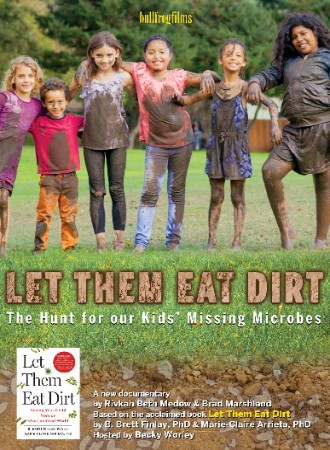
Let Them Eat Dirt: The Hunt for our Kids’ Missing Microbes 2019
Distributed by Bullfrog Films, PO Box 149, Oley, PA 19547; 800-543-FROG (3764)
Produced by Rivkah Beth Medow and Brad Marshland
Directed by Rivkah Beth Medow and Brad Marshland
Streaming, 58 mins
High School - General Adult
Child Development; Chonic Disease; Microbiota
Date Entered: 05/29/2020
Reviewed by Bradley Long, Embedded Health Sciences Librarian, Pennsylvania State UniversityLet Them Eat Dirt: The Hunt for our Kids’ Missing Microbes is a Canadian-based educational documentary that addresses how modern changes to the human microbiome could be negatively impacting the health of North American children. The film focuses on four areas of concern: the modern lifestyle, cesarean-section births, the overuse of antibiotics, and the North American diet. It also focuses on potential solutions, such the positive impact of breast feeding, becoming a less “germ-a-phobic” society, and the development of novel microbial therapy techniques.
This film is hosted by Good Morning America’s Becky Worley. It is based on the book "Let Them Eat Dirt : Saving Your Child from an Oversanitized World" by B. Brett Finlay and Marie-Claire Arrieta. Drs. Finlay and Arrieta both appear prominently in the documentary and also serve as the film’s science advisors. The supporting website serves primarily as a promotional site for their book and this film. Several of the high-quality animations shown within the film are also freely accessible on the website.
Let Them Eat Dirt provides a fairly balanced approach to discussing the potential cause-effect relationship between the changing intestinal biome with increasing incidents of chronic diseases among the North American pediatric population. It is a fact-based film that utilizes both historical and modern data to help support the viewpoint that the immune system is weakened due to many factors affecting the microbiota. Therefore, the film concludes that is fine to let children play and live in less sterilized environments, in order to help them strengthen their immune systems (e.g. let them eat dirt).
This film should work well for advanced placement high school biology courses and undergraduate college courses within the health sciences, nursing, nutrition, biology, and environmental sciences. It could be used as a catalyst for in-class debate over how parental choices and local environmental factors may potentially influence the overall health our growing children. It also could be used for consumer health education, in order to demonstrate to parents that it is fine to let their children play without constantly cleaning and/or sterilizing their child’s hands and the items that they touch.